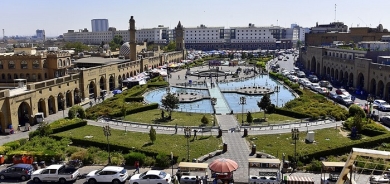China reports 1st visit of Syrian opposition; Israel fears arms transfer to Hezbollah

The delegation from the Syrian National Coordination Body for Democratic Change, lead by its deputy general coordinator Hassan Mana, made a four-day trip to China, leaving on Thursday,
Foreign Ministry spokesman Liu Weimin said.
They met Chinese Vice Foreign Minister Zhai Jun and other senior diplomats.
“Both sides exchanged views on the present situation in Syria and China explained its principles and position ... and called on all sides to immediately stop the violence,” Liu told a daily news briefing.
“The Syrian government should earnestly fulfill its promises, urgently begin an inclusive reform process that has wide participation, and resolve disputes and conflicts via talks and consultations,” he said, repeating that China was a friend of the Syrian people.
“China is willing to maintain contacts and communication with relevant Syrian opposition groups, is willing to push and encourage talks and make great efforts to ameliorate the situation.”
China will “make unstinting efforts towards peace and stability in Syria,” he said.
“The delegation said they appreciated China’s stance on the Middle East question and hoped it would play an even greater role so that Syria can emerge from the crisis at an early date,” Liu added.
The mainly Syria-based National Coordination Body is opposed to foreign intervention in the crisis, but not Arab involvement.
China joined Russia at the weekend to veto the resolution in the Security Council that would have backed an Arab plan urging President Bashar al-Assad to quit after months of worsening bloodshed.
The veto has been heavily condemned by Western governments and many in the Arab world.
Beijing has rejected criticism of its veto of the resolution, insisting that it was committed to the long-term interests of the Syrian people.
Earlier this week, the Chinese government said it was considering sending an envoy to the Middle East to discuss the crisis in Syria.
Opposition sources in Syria on Thursday said that armored reinforcements were pouring into Homs as Assad’s forces bombarded the city for a fourth day, worsening the humanitarian situation and prompting a new diplomatic push from Turkey.
Israel fears arms transfer
Meanwhile, Israel Defense Minister Ehud Barak warned on Thursday that sophisticated weapons could be transferred from Syria to militant group Hezbollah and to Lebanon if the regime of Bashar al-Assad falls.
“You have to be alert to the possibility so that during the fall of the regime there will not be the transfer of sophisticated Syrian weapons to Hezbollah and Lebanon,” he told Israeli military radio.
“We are tracking this issue constantly and carefully,” he said, without giving further details.
Barak said Israeli assessments suggest Assad’s downfall was a matter of time.
“The fate of the regime of Bashar al-Assad is sealed; his situation is getting worse every week,” he said.
Israel has been closely following developments in neighboring Syria, where Assad’s regime has launched a violent crackdown against political opponents, leaving more than 6,000 dead, according to activists.
Israel fears it could suffer from various consequences of the regime’s weakening and collapse, including a wave of refugees, or even attempts by the regime to distract attention by attacking the Jewish state.
Officials have also warned that Syria’s weapons, including alleged chemical and biological ones, could fall into the hands of militants, including Hezbollah, which fought a war with Israel in 2006.
Last month, Major General Amir Eshel, the incoming chief of Israel’s air force, said Syria possessed “huge stockpiles” of such weapons.
“The immediate concern is the huge stockpiles of chemicals, biological, strategic capabilities that are still going into Syria, mainly from eastern Europe,” he said.
“That’s a major concern because I don’t know who is going to own those the day after. Up till now, what has been transferred to Hezbollah? What will be transferred to Hezbollah? What will be divided between those factions inside Syria? What is that going to create?”
The U.N. estimates that 5,400 people have been killed in Syria since the uprising began in March. But that figure is from January, when the U.N. stopped counting because deteriorating security prevented verification of the figures.
(Reuters)














